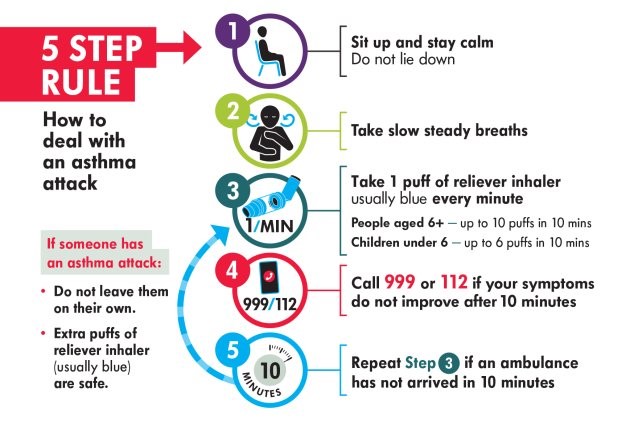Asthma is a condition that affects the airways-the small tubes that carry air in and out of the lungs. With asthma, the airways become over-sensitive and react to things that would normally not cause a problem, such as cold air or dust. Muscles around the wall of the airway tighten up, making it narrow and difficult for the air to flow in and out. The lining of the airways gets swollen (just like your nose during a cold) and sticky mucus is produced, clogging up the breathing passages. With the airways narrowed like this, you can see why it becomes difficult for air to move in and out and why the chest has to work so much. Tightening of muscle around the airways can happen quickly and is the most common cause of mild asthma. It can be relieved quickly too, with the right inhaler.
If you suspect you may have asthma contact the DIT Student Health Centre to investigate further.
The usual symptoms of asthma are:
- Difficulty in breathing/shortness of breath
- A tight feeling in the chest
- Wheezing (a whistling noise in the chest)
- Coughing-Hoarse, particularly at night
You may experience one, several or all of the symptoms above. These symptoms may occur in episodes, perhaps brought on by colds or chest infections, exercise, change of temperature, dust or other irritants in the air, or by an allergy e.g. pollen or animals. Episodes at night are common, often waking the patient. A few people have these complaints all the time. You need to see your doctor, who will check that there is not some other explanation. By examining your chest, doing breathing tests and listening to your description of symptoms, the doctor can usually decide if you have asthma and can prescribe some suitable treatment.
Asthma and Allergic Rhinitis (Hayfever)
Allergic Rhinitis is very common in Ireland and between 60% and 80% of people who have asthma also have allergic rhinitis. Both asthma and allergic rhinitis are caused by an allergic reaction and the two conditions frequently overlap.
Many of the same allergens are known to trigger asthma and allergic rhinitis. If allergic rhinitis is treated effectively it could reduce asthma symptoms and may even help prevent the development of asthma.
For more info check out the Asthma Society of Irelands website.
- Asthma attacks can happen when symptoms get worse over a number of days ,hours or can happen suddenly, due to coughs cold or other triggers. If a person or you has an asthma attack or you suspect they are having an attack, you should take immediate action.
- Remember the 5 Step Rule
- Do not leave them on their own.
Extra puffs of reliever inhaler (usually blue) are safe.

Asthma
- Asthma and COPD Adviceline | Asthma Society of Ireland
- Asthma society of Ireland services
- Asthma Friendly Home
- Asthma Friendly Bedroom
- Asthma Triggers in the Bedroom
- Asthma and Exercise
- Asthma and Swimming
- Asthma and the Environment
- Asthma Triggers in the Home
- Asthma Allery Testing
Video
Asthma Management Videos

/filters:quality(80)/0x0:1920x300/prod01/tudublin-cdn-pxl/media/website/images/header/students-blanchardstown-canteen-header-1920X300.jpg)